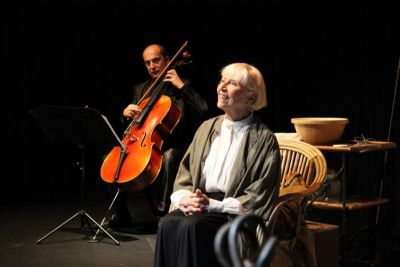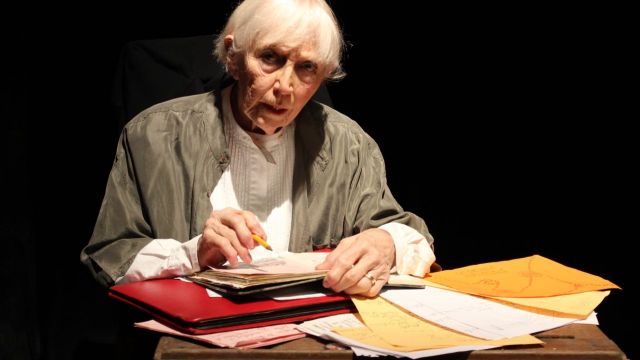Tales of Kabbarli
Because of her own commitment to and work with indigenous Australians, Robina Beard feels she is almost channeling Daisy Bates in this one-woman tribute to the Irish immigrant journalist who became the champion of aboriginal people until her death in 1951.
Beard speaks emotionally of the parallels that are apparent in the words written so long ago by Bates and the conditions of aboriginal people today. “What we are doing is still not enough!” she says.
Kabbarli(“that’s my name, the Mother”), compiled and directed by Geoffrey Sykes, is based on her own words taken from published papers and personal records of Bates’ life in outback Australia. In compiling the work, Sykes has tried to capture some of her wonder and love of nature – “crests of cockatoo feathers of curious colours” – and her deep esteem for the aboriginal tribes with whom she spent so much of her life. This is no easy task and there are transitions that could become confusing in the hands of a less accomplished actor and choreographer.
But Robina Beard is deft at finding exactly the right movement and intonation to take the audience from the lonely starry skies of a sleepless night in the desert “I must rest before I entertain the day” –to her meeting with a tribal elder, and to her memories of her brief marriages to Harry (The Breaker) Morant and John Bates. “Was I a wife? If so to what man? The quiet farmer? The crazed breaker?”… “My life’s a puzzle, that’s for sure!”
 Dressed in the dark Edwardian garb that Bates preferred – black skirt and jacket, stockings and boots – Beard takes the audience to brief but poignant moments in Bates’ life, with the dancer’s skill of using movement to suggest changes in place and time before the words that confirm them. She is still a delight to watch on the stage – and her soft Irish accent recreates Bates’ words in all their lilting beauty … “sweet sylvan ceremonies of the past”.
Dressed in the dark Edwardian garb that Bates preferred – black skirt and jacket, stockings and boots – Beard takes the audience to brief but poignant moments in Bates’ life, with the dancer’s skill of using movement to suggest changes in place and time before the words that confirm them. She is still a delight to watch on the stage – and her soft Irish accent recreates Bates’ words in all their lilting beauty … “sweet sylvan ceremonies of the past”.
The set exemplifies the conditions under which Bates chose to live – the open flaps of a tent mirrors that in an old photograph of her campsite; a wash stand outside and a worn desk and chair beside a dying fire represent the conditions under which she wrote. Projections on a dark fabric screen pick up bits and pieces of her story – proud tribal elders, water falling through searching hands, Bates herself presenting her papers – accentuating the changes in place and pace and mood.
The performance is accompanied by cellist Ilir Merxhushi, and though the notes are very haunting, and at times cunningly suggest the night sounds of the bush, they are sometimes a little overpowering and distracting – as was the static from the radio mike that Beard managed to ignore very successfully. It must have been as disturbing for her as it was for this first night audience, and something that needs to be fixed quickly!
Together Sykes and Beard have created a brief but vibrant tribute to a woman who recorded the culture, rites, beliefs and customs of the aboriginal tribes with whom she lived – and for whose welfare she fought so strongly. While it is lyrical and moving, like Beard and the woman she portrays, it’s also just a little feisty.]
Carol Wimmer
Subscribe to our E-Newsletter, buy our latest print edition or find a Performing Arts book at Book Nook.

